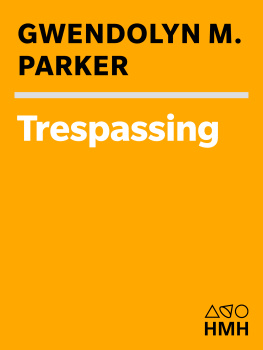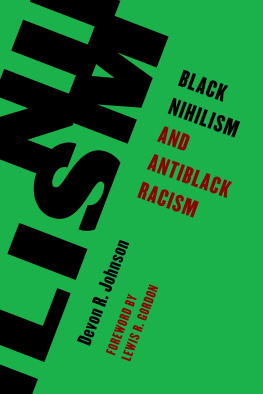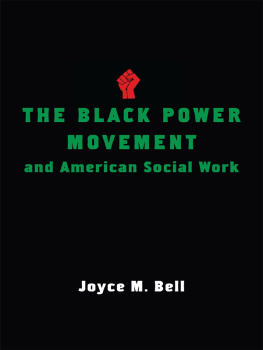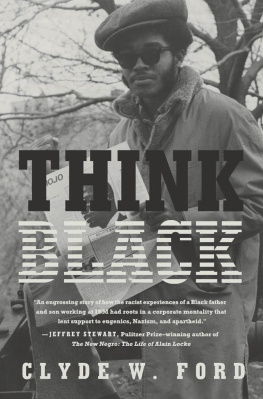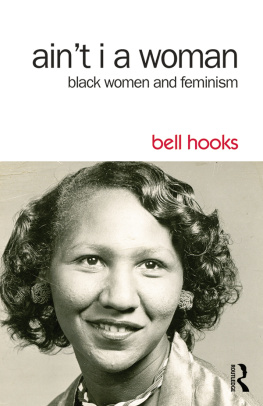Copyright 1997 by Gwendolyn M. Parker
All rights reserved
For information about permission to reproduce selections from this book, write to or to Permissions, Houghton Mifflin Harcourt Publishing Company, 3 Park Avenue, 19th Floor, New York, New York 10016.
hmhbooks.com
The Library of Congress has cataloged the print edition as follows:
Parker, Gwendolyn M.
Trespassing : my sojourn in the halls of privilege /
Gwendolyn M. Parker.
p. cm.
ISBN 0-395-82297-1
1. Parker, Gwendolyn M.Biography. 2. Afro-American women novelists 20th centuryBiography. 3. Race relationsUnited States. 4. Middle classUnited States. I. Title.
PS 3566. A 6786 Z 473 1997
813'.54dc2 I [B] 97-19951 CIP
eISBN 978-0-547-56168-4
v2.1220
In memory of
Dr. Aaron McDuffie Moore
and the
Honorable John Bonner Duncan, Esq.,
for the continuing example
of their lives
Acknowledgments
Many thanks are due. First and foremost to my editor, Janet Silver, for encouraging me to tell this story; my agent, Marie Brown, whose efforts on my behalf always go far beyond the call of duty; my friend Joan, for patient listening, humor when needed, and thoughtful criticism; Mariella, for helping make the deadlines possible; Fatima and Sophie, for tea and sustenance; Marie and Ken of Lourie Lodge in South Africa, for four walls, a desk, and a view with flowers; Dawn, Nicole, Dan, Ronn, and K.C., for friendly support; my wild community of neighbors and friendsAlta, Kjell, Cathy, Margarett, and Moewho helped with chores, lent me their cars, and offered fashion consults; and my four-year-old daughter, Lena, who, as she put it, waited so nicely. And last, to the rest of my familymy mother, father, brothers, and ancestorsfor allowing me to raid our collective lives.
PROLOGUE
Ghostly Remains
E VEN AS I WAS on the verge of letting it go, part of me still wanted to hang on. Not just to the obvious things, like the good money and the more than comfortable life that it purchased, but to the intangible of the persona, the identity itself. Even though Id been wearing that identity more and more like a ghost, it still provided a measure of comfort, and cover: inside it, I was not left shifting about in my own naked skin. My protective covering also allowed me the option of hovering. I could always choose to be slightly above and apart. My particular costume was that of the accomplished black business professional. I wore it with a dash of cynicism cinched at the waist, but no amount of cynicism could undo the suit itself. It was carefully crafted.
I was wearing one of those well-tailored suits on that spring day in 1986 as I sat in the new corporate headquarters of the American Express Company at the World Financial Center, waiting to see the personnel officer with whom Id made an appointment. She did not keep me waiting for long. Precisely at ten, she ushered me into her office, a small interior room with a solid wall instead of the smoky taupe glass partition that was standard issue for most middle-management offices in this new complex to which the company had moved just a few months before. The personnel officer and I knew each other, but not so well as to require prolonged pleasantries. It was therefore acceptable, after a few moments, for me to turn immediately to the subject at hand.
As she waited for me to begin, I had the briefest sensation of dislocation. It was not a wholly new sensation. For several weeks Id had a similar feeling, as if I were set slightly apart. The refracted light in the office appeared to be causing everything in its ambit to change. The personnel officers desk was not overly large, and as a result, we sat only a few feet from each other. She was quiet and still as she waited.
I suddenly wondered what my parents would say if they knew I was here. After all, these halls were my home now. I had sojourned for over ten years in themcenters of power and prestige in white America. Id been trained in their very own breeding grounds, made my career at institutions that were still, at their pinnacles, overwhelmingly white and male. And though as a black female I was the perpetual outsider, persistently viewed as a trespasser on private preserves, at the same time it was a role Id been groomed for since birth. I hailed from a small Southern town once described as the home of the black middle class, was the daughter of a pharmacist and a teacher, granddaughter to a banker and a businessman, great-granddaughter of a doctor whod built one of the largest black-owned businesses. Ever since I left my cosseted Southern world, Id honed my act as the first, or one of a handful, of blacks or women or both. Along with one other black girl, I integrated an exclusive boarding school, Kent, in Connecticut. With a few other black women I represented my race at Radcliffe College in the turbulent 1960s. Mine was the sole black female face at the conservative white-shoe Wall Street firm Cadwalader, Wickersham & Taft. And during my eight years at American Express, as a director, Id been among a handful of blacks and women straining toward senior management. Where I was now was where all of the familial expectations had led. Still, I had not told my parents, nor any of my family except one of my brothers, what Id planned. And though it had been all that Id thought of for weeks, now that the moment had come, I still couldnt believe it. Nevertheless, Id done nothing irrevocable. I could make up another reason for this meeting. I did not, in fact, have to utter any of the words Id rehearsed so carefully.
I have had a good career here with American Express, I began, and that much was true. On the surface of things, I certainly had no cause to complain. Since Id joined the company nearly eight years before, the promotions had come at a fast-track pace, each one, up until this last job, in less than two years. I had been named a Black Achiever in Industry. I had been in departments that were the envy of many of my colleagues, working, for example, on the highly visible Shearson acquisition. I was even on a first-name basis with some of the most senior people in the company.
And throughout my years here, one thing was always consistentI was always treated fairly.
This was also primarily true. True on the level of personal choice, true of the stated and best of intentions. But as the years had gone by, Id been forced to confront again and again the limits of merely evenhanded treatment. Treating me fairly did not change the yardstick by which I was judged. It did not alter the standards to which I was held. It did not transform me, in one iota, from a constant exception to the general rule. Nothing, in fact, about the treatment of me changed the habits, predilections, and foundations that made this company the institution it was, with the values that formed and sustained it, values that mirrored my own in many places, and diverged as sharply in other places as the currents that had formed each of us went where no one could touch them, underground. In all the meetings Id participated in, Id thought of myself as just a slim brown face pulling up to the table, prepared like everyone else to meet the task at hand. But my brownness, my femaleness, my unexpected competence, even the surprising fact of my middle-class status, could not help but confound a culture that thinks it knows who I am, and where I should be, and is ever threatened when I turn up where Im least expected.
Fairness has been important to me, I continued, and that much was also accurate, how the level of personal intention had been both a balm and a distraction, blinding me to the realities of how far personal intentions might go.
Now all Im asking is that the company continue to do the same.

